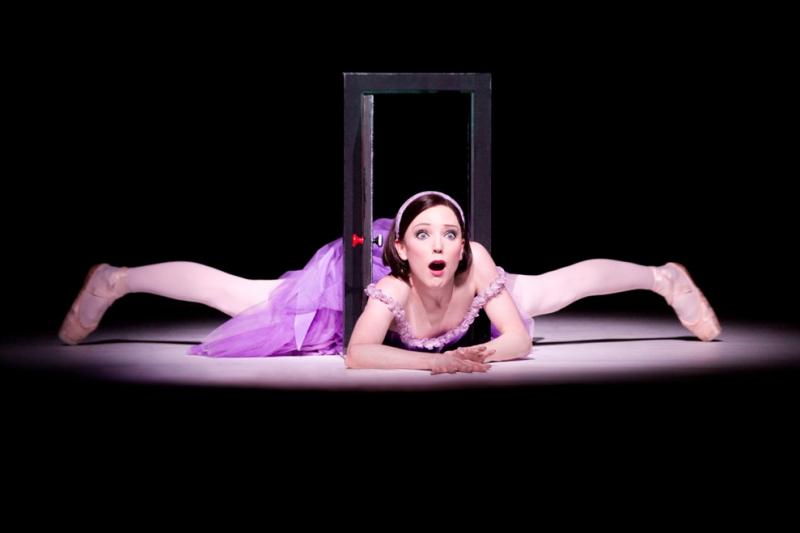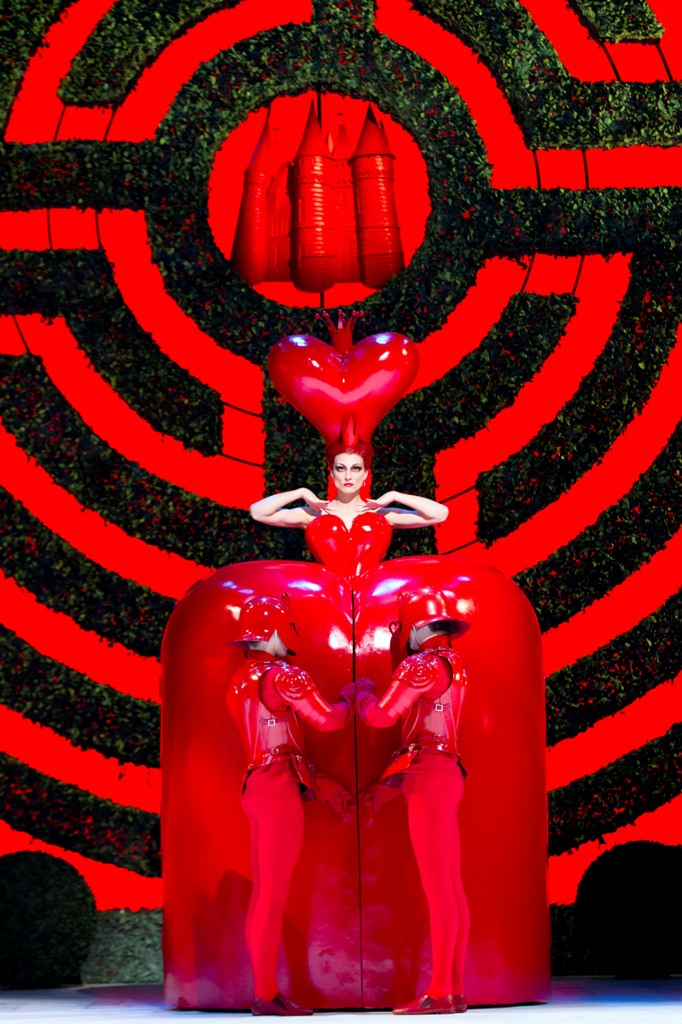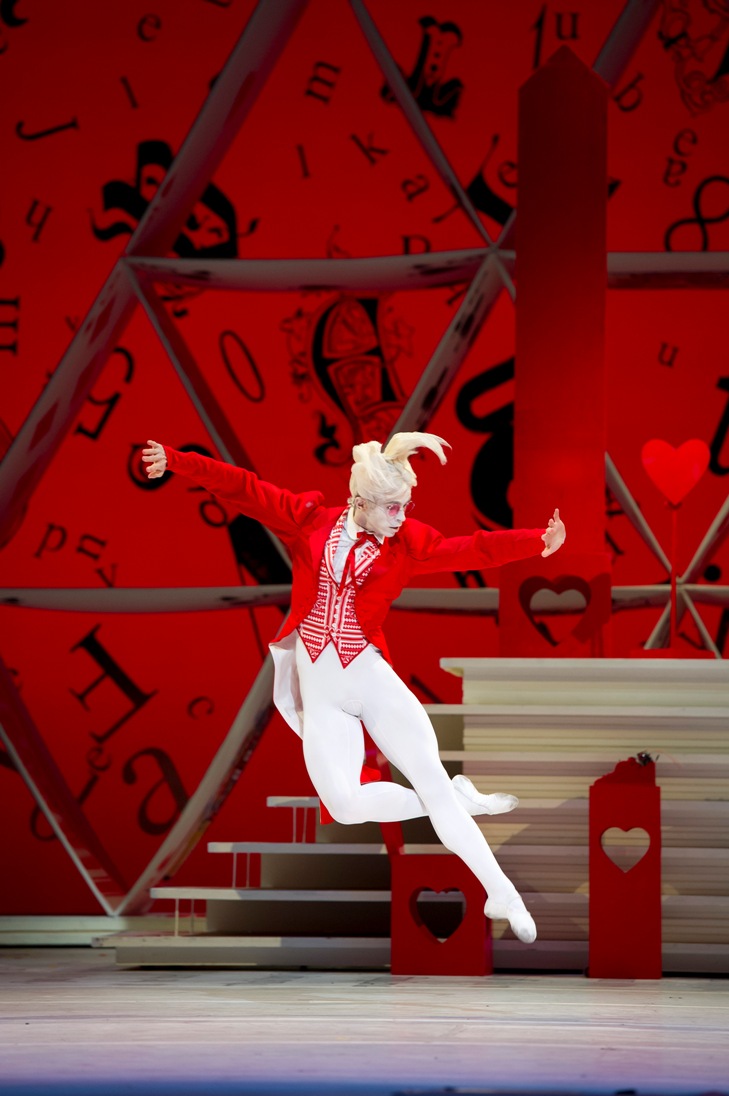Alice's Adventures in Wonderland (2014), Royal Ballet | reviews, news & interviews
Alice's Adventures in Wonderland (2014), Royal Ballet
Alice's Adventures in Wonderland (2014), Royal Ballet
Classy dance, design and music, marinated just a little long in the treacle well

Christopher Wheeldon’s hard-working mix of skewed classical ballet, vaudeville and Victorian theatrical magic achieved through state-of-the-art technique wasn’t much liked by theartsdesk’s critics on its first and second outings. Marvelling at it on DVD as I worked on the notes for that release, I wondered why. Now it’s clearer that many of the special effects and characterisations work best in close up.
You’ll get your money's worth simply from the wonders of Bob Crowley, a designer who’s moved with the times, hand-in-glove with projection design from Jon Driscoll and Gemma Carrington and the puppetry of the fabulous Cheshire Cat. All that expenditure has proved itself for this durable three-act ballet. Still, I’d have been happier if Wheeldon had kept it to the original two and pared down. Bbut while the first two curtains are weak, at least without a decided over-extended first act, you’re fresh for Alice’s identity-crisis solo and a caterpillar sequence which, while still pandering to ballet’s old-fashioned love of dodgy orientalism, doesn’t now outstay its welcome.
 We’re never going to get round the basic fact that Lewis Carroll’s strange meetings were mostly a pretext for word-play, but Wheeldon and his team have exercised huge imagination in finding suitable substitutes. He wisely doesn’t try to cram in anything from Through the Looking-Glass and he does his best to thread the picaresque element with parallels between a teenage Alice’s romance with a Christ Church gardener dismissed by her haughty mother and her dream pursuit of him as the Knave of Hearts, a putative tart-stealer wanted by mama transfigured as the Queen of Hearts.
We’re never going to get round the basic fact that Lewis Carroll’s strange meetings were mostly a pretext for word-play, but Wheeldon and his team have exercised huge imagination in finding suitable substitutes. He wisely doesn’t try to cram in anything from Through the Looking-Glass and he does his best to thread the picaresque element with parallels between a teenage Alice’s romance with a Christ Church gardener dismissed by her haughty mother and her dream pursuit of him as the Knave of Hearts, a putative tart-stealer wanted by mama transfigured as the Queen of Hearts.
Many of the original charmers and dancers with a gift for comedy were back again on this first night. The star turn, of course, is Zenaida Yanowsky (pictured right by Johan Persson) as a pathological society-hostess Queen with a mug readable, I should imagine, from the back of the amphitheatre and consummate slides from classical elegance into splits and other contortions – artistry for which the Rose Adagio parody and her tango solo richly cater. Sarah Lamb makes Alice’s constant presence seem easy and sweet without archness – impressive that the Royal Ballet could find a second heroine as good as Lauren Cuthbertson, and there are no doubt others – while Vadim Muntagirov, replacing an injured Federico Bonelli, has the perfect boy-next-door look as the most personable of Jack/Knaves and gives the court-room pleading a special virile energy.
 Alexander Campbell took over the Mad Hatter’s routine from fellow Sydneyite Steven McRae, understandably not quite so nifty as that king of tap danfor whom Wheeldon devised the role. Ricardo Cervera (pictured left by Bill Cooper) is a White Rabbit of less pronounced neuroses than Edward Watson (though that may be the difference between staging seen from a distance and DVD close-up), and in any case he relaxes into the role, ending with a precise bunny-twitch for the latter-day Carroll who brings down the curtain. Simon Russell Beale’s dance debut as the Duchess didn’t seem quite right in the first run, but Philip Mosley makes little enough of the character: it may be that consummate drag dancer Alastair Marriot finds Ugly-Sister magic later in the run, but the Duchess's scene with the meat-cleaving Cook and the crying baby remains along with the Caucus Race one of the few weak stretches. Choreographically, it's really not up to the savage strains of the music.
Alexander Campbell took over the Mad Hatter’s routine from fellow Sydneyite Steven McRae, understandably not quite so nifty as that king of tap danfor whom Wheeldon devised the role. Ricardo Cervera (pictured left by Bill Cooper) is a White Rabbit of less pronounced neuroses than Edward Watson (though that may be the difference between staging seen from a distance and DVD close-up), and in any case he relaxes into the role, ending with a precise bunny-twitch for the latter-day Carroll who brings down the curtain. Simon Russell Beale’s dance debut as the Duchess didn’t seem quite right in the first run, but Philip Mosley makes little enough of the character: it may be that consummate drag dancer Alastair Marriot finds Ugly-Sister magic later in the run, but the Duchess's scene with the meat-cleaving Cook and the crying baby remains along with the Caucus Race one of the few weak stretches. Choreographically, it's really not up to the savage strains of the music.
The music itself waxes ever more attractive under Canadian National Ballet MD David Briskin’s confident baton. Joby Talbot’s melodies don’t extend beyond short strains, but I hear more now how he transfigures the Hearts-kingdom tune from waltz to variation, and the "leitmotifs" for each character are well drawn. Most effective is the percussion-glittering orchestration, shared by Talbot with Christopher Austin and nodding to Ravel and Debussy as well as contemporary minimalists.
If the score would only occasionally settle to simplicity instead of digging deeper into the treacle well, it would be a modern classic. It’s at its best serving the Balanchinesque corps card dance – consummate, as are the flamingoes and kid hedgehogs of the croquet game – and the Fokine ensemble number in the court room. A shame the ensuing Pas de deux is so sugary, but this again is where pruning wouldn’t have gone amiss. But like I pointed out, you get your money's worth, even if, as Tchaikovsky said of the Nutcracker premiere, the eye tires of so much opulence.
rating
Share this article
The future of Arts Journalism
You can stop theartsdesk.com closing!
We urgently need financing to survive. Our fundraising drive has thus far raised £49,000 but we need to reach £100,000 or we will be forced to close. Please contribute here: https://gofund.me/c3f6033d
And if you can forward this information to anyone who might assist, we’d be grateful.

Subscribe to theartsdesk.com
Thank you for continuing to read our work on theartsdesk.com. For unlimited access to every article in its entirety, including our archive of more than 15,000 pieces, we're asking for £5 per month or £40 per year. We feel it's a very good deal, and hope you do too.
To take a subscription now simply click here.
And if you're looking for that extra gift for a friend or family member, why not treat them to a theartsdesk.com gift subscription?
more Dance
 'We are bowled over!' Thank you for your messages of love and support
Much-appreciated words of commendation from readers and the cultural community
'We are bowled over!' Thank you for your messages of love and support
Much-appreciated words of commendation from readers and the cultural community
 R:Evolution, English National Ballet, Sadler's Wells review - a vibrant survey of ballet in four acts
ENB set the bar high with this mixed bill, but they meet its challenges thrillingly
R:Evolution, English National Ballet, Sadler's Wells review - a vibrant survey of ballet in four acts
ENB set the bar high with this mixed bill, but they meet its challenges thrillingly
 Like Water for Chocolate, Royal Ballet review - splendid dancing and sets, but there's too much plot
Christopher Wheeldon's version looks great but is too muddling to connect with fully
Like Water for Chocolate, Royal Ballet review - splendid dancing and sets, but there's too much plot
Christopher Wheeldon's version looks great but is too muddling to connect with fully
 iD-Reloaded, Cirque Éloize, Marlowe Theatre, Canterbury review - attitude, energy and invention
A riotous blend of urban dance music, hip hop and contemporary circus
iD-Reloaded, Cirque Éloize, Marlowe Theatre, Canterbury review - attitude, energy and invention
A riotous blend of urban dance music, hip hop and contemporary circus
 How to be a Dancer in 72,000 Easy Lessons, Teaċ Daṁsa review - a riveting account of a life in dance
Michael Keegan-Dolan's unique hybrid of physical theatre and comic monologue
How to be a Dancer in 72,000 Easy Lessons, Teaċ Daṁsa review - a riveting account of a life in dance
Michael Keegan-Dolan's unique hybrid of physical theatre and comic monologue
 A Single Man, Linbury Theatre review - an anatomy of melancholy, with breaks in the clouds
Ed Watson and Jonathan Goddard are extraordinary in Jonathan Watkins' dance theatre adaptation of Isherwood's novel
A Single Man, Linbury Theatre review - an anatomy of melancholy, with breaks in the clouds
Ed Watson and Jonathan Goddard are extraordinary in Jonathan Watkins' dance theatre adaptation of Isherwood's novel
 Peaky Blinders: The Redemption of Thomas Shelby, Rambert, Sadler's Wells review - exciting dancing, if you can see it
Six TV series reduced to 100 minutes' dance time doesn't quite compute
Peaky Blinders: The Redemption of Thomas Shelby, Rambert, Sadler's Wells review - exciting dancing, if you can see it
Six TV series reduced to 100 minutes' dance time doesn't quite compute
 Giselle, National Ballet of Japan review - return of a classic, refreshed and impeccably danced
First visit by Miyako Yoshida's company leaves you wanting more
Giselle, National Ballet of Japan review - return of a classic, refreshed and impeccably danced
First visit by Miyako Yoshida's company leaves you wanting more
 Quadrophenia, Sadler's Wells review - missed opportunity to give new stage life to a Who classic
The brilliant cast need a tighter score and a stronger narrative
Quadrophenia, Sadler's Wells review - missed opportunity to give new stage life to a Who classic
The brilliant cast need a tighter score and a stronger narrative
 The Midnight Bell, Sadler's Wells review - a first reprise for one of Matthew Bourne's most compelling shows to date
The after-hours lives of the sad and lonely are drawn with compassion, originality and skill
The Midnight Bell, Sadler's Wells review - a first reprise for one of Matthew Bourne's most compelling shows to date
The after-hours lives of the sad and lonely are drawn with compassion, originality and skill
 Ballet to Broadway: Wheeldon Works, Royal Ballet review - the impressive range and reach of Christopher Wheeldon's craft
The title says it: as dancemaker, as creative magnet, the man clearly works his socks off
Ballet to Broadway: Wheeldon Works, Royal Ballet review - the impressive range and reach of Christopher Wheeldon's craft
The title says it: as dancemaker, as creative magnet, the man clearly works his socks off
 The Forsythe Programme, English National Ballet review - brains, beauty and bravura
Once again the veteran choreographer and maverick William Forsythe raises ENB's game
The Forsythe Programme, English National Ballet review - brains, beauty and bravura
Once again the veteran choreographer and maverick William Forsythe raises ENB's game

Add comment